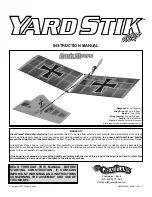
INTRODUCTION ...............................................................2
SAFETY PRECAUTIONS..................................................2
DECISIONS YOU MUST MAKE ........................................3
Radio Equipment ...............................................................3
Speed Controller ................................................................3
Battery ...............................................................................4
Charger ..............................................................................4
ADDITIONAL ITEMS REQUIRED.....................................4
Building Supplies ...............................................................4
Optional Items....................................................................4
ORDERING REPLACEMENT PARTS ..............................4
KIT CONTENTS ................................................................5
ASSEMBLY .......................................................................6
Assemble the Tail ...............................................................6
Mount the Fuselage Parts .................................................7
Mount the Motor.................................................................9
FINAL SET UP ................................................................10
Set Up the Radio .............................................................10
Set the Control Throws ....................................................11
Apply the Decals..............................................................12
Mount the Wings and Check the C.G. .............................12
CHECKLIST ....................................................................13
PREFLIGHT.....................................................................13
Identify the Model ............................................................13
Charge the Batteries........................................................14
Range Check ...................................................................14
PERFORMANCE TIPS ....................................................14
Balance the Propeller ......................................................14
Cycle the Batteries...........................................................14
MOTOR SAFETY PRECAUTIONS .................................14
AMA SAFETY CODE ......................................................15
FIND A SAFE PLACE TO FLY ........................................15
FLYING ............................................................................15
Congratulations and thank you for purchasing the Great
Planes Yard Stik. Since park flyers are small and fly slowly,
little space is required. In fact, the Yard Stik can be flown
both indoors and outdoors. Park flyers are also perfect for
those evenings at the field when everybody else is packing
up their gear, the wind has died and there is still enough light
to fly a small, slow model that can be kept close-in.
The Yard Stik is a slow flying model that is about as simple-
to-build as they get. However, if you have never flown an R/C
model before, learning to fly the Yard Stik all by yourself is
not recommended. As with any trainer airplane, you should
find an experienced modeler to help you with your first
flights. Information about R/C clubs and instructors is
provided later in this manual.
Attention: The product you have purchased is
powered by a rechargeable battery. At the end of its useful
life, under various state and local laws, it may be illegal to
dispose of this battery into the municipal waste system.
Check with your local solid waste officials for details in your
area for recycling options or proper disposal.
This product contains a chemical known to the state of
California to cause cancer and birth defects or other
reproductive harm.
1.
Even though the Yard Stik is small, lightweight and
flies slowly, if it is not assembled and operated correctly it
could possibly cause injury to yourself or spectators and
damage property.
2.
Build the plane according to the instructions. Do not
alter or modify the model, as doing so may result in an
unsafe or unflyable model.
3.
Use an R/C radio system that is in first-class condition.
This Park Flyer requires micro servos, a micro receiver and
a micro speed control able to handle 5 amps.
4.
You must properly install all R/C and other components so
that the model operates properly on the ground and in the air.
5.
You must test the operation of the model before every
flight to insure that all equipment is operating and that the
model has remained structurally sound. Be sure to check
connectors often and replace them if they show signs of
wear or fatigue.
PROTECT YOUR MODEL, YOURSELF
& OTHERS...FOLLOW THESE
IMPORTANT SAFETY PRECAUTIONS
CAUTION: Be aware that the Yard Stik is operated on the
same frequency band as larger, “regular” R/C models. If
flying your Yard Stik within five miles of an R/C site, there
is a real possibility that you could be operating your model
on the same frequency (channel) as another R/C pilot. If
this happens, a crash will result–with the person flying the
more expensive model suffering the greater loss (and
having greater potential for property damage or injury).
The best way to avoid this is to join an R/C club and fly
at the site where frequency control measures will be in
effect. If you do insist on flying elsewhere, always be
aware of your proximity to R/C flying sites.
INTRODUCTION
TABLE OF CONTENTS
2


































